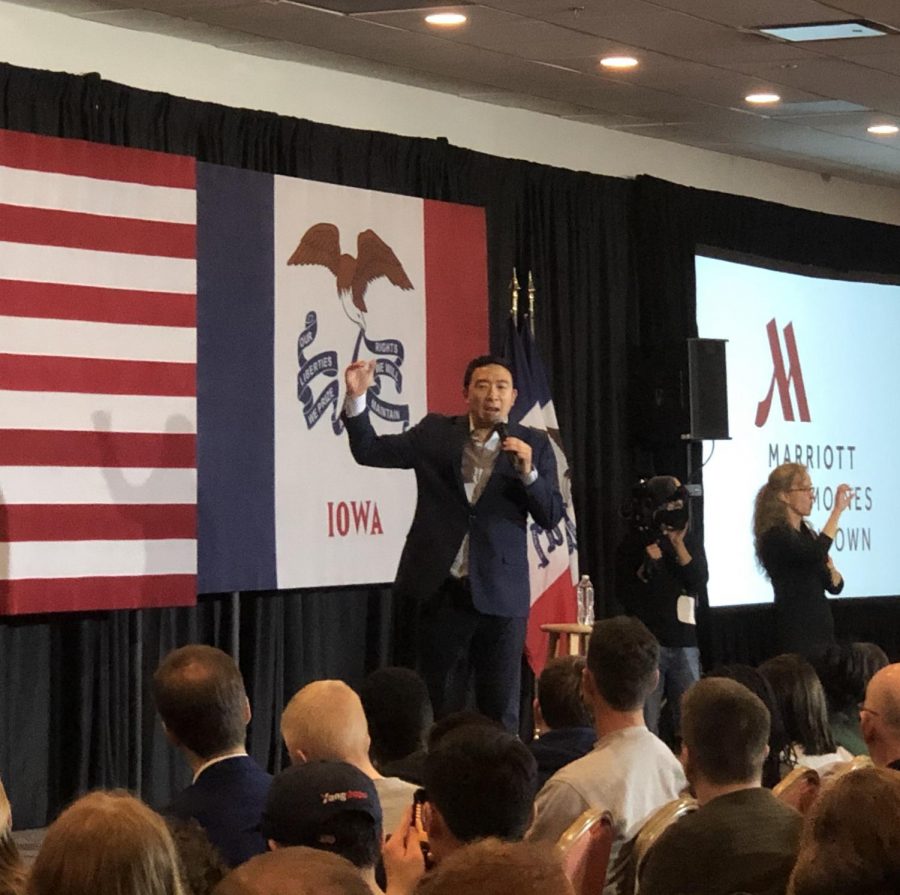In a Nutshell: Andrew Yang
The Great Democracy Field Trip
Entrepreneur Andrew Yang addresses the crowd at a rally in Des Moines Saturday night. He was energetic, knowledgeable, and confident in his ability to win the Democratic nomination and the general election by making America think harder.
February 2, 2020
News Editor Casey Murray is on the ground in Iowa, covering the caucuses. His ongoing series “In a Nutshell” will report on the various candidates vying for the Democratic nomination.
DES MOINES, IOWA — Democratic presidential hopeful Andrew Yang was elaborating on his plan for universal basic income, a system where the federal government would provide $1,000 a month to every American. He started by drawing an analogy with Alaska’s oil-funded Permanent Fund Dividend, which provides an annual check to every Alaskan resident.
He explained that giving private citizens the right to their data would channel money from tech firms into the hands of the American people. “How much of [ad revenue generated from the sale of data] will stay in Iowa?” he asked.
Suddenly he broke into a run back to the other side of the stage. “Sorry, this side!” he exclaimed to a wave of laughter from the crowd.
More than 800 people attended Mr Yang’s final Iowa rally at the Marriott in Des Moines tonight, filling the room to capacity and spilling out beyond — “We’re past the fire code!” field organizer Mike French cried excitedly.
The crowd at the rally was young, diverse, and extremely energetic. Chants of “All the way! All the way!” filled the room well before he stepped onstage and Mr Yang was buried under an avalanche of autograph-seekers immediately after the end of the event.
At his event in Dubuque on Saturday, Pete Buttigieg sought to distinguish himself with a cerebral and unity-focused message. Mr Yang proved far more successful in that endeavor.
“The fundamental question [that Democrats have yet to answer] is this,” he posited. “How did Donald Trump win your state, a purple swing state, by 10 points?”
Mr Yang then proceeded to dissect the present state of the U.S. economy in a logical, fact-based, building argument centered around his thesis: that American society is undergoing a fourth industrial revolution.
The increasing ability of firms to automate human beings into irrelevance is the primary driver in the vanishing of industrial jobs in the Midwest, he said. From car manufacturers to truck drivers to retailers, he said, the machines are coming for our jobs. Yet nobody in Washington, D.C. is even discussing the matter.
“When’s the last time you heard a politician say ‘Fourth Industrial Revolution’?” he demanded. “Three seconds ago, and I’m barely a politician!”
“We’re in the middle of the greatest winner-take all economy in the history of the world,” he explained more measuredly. “If your first name is ‘big’ and your second name is ‘company’ it’s working pretty well, but otherwise…”
Mr Yang made some mention of his involvement in Venture For America, a nonprofit that recruits recent college graduates to create jobs in cities hard-hit by the Great Recession — a list including Detroit, Birmingham, and Pittsburgh, among many others. Mostly, however, he focused on the two years he has spent campaigning in Iowa, speaking about the people he had met over that time. This technique — termed prosopopoeia and intended to create an emotional connection — was also used by Mr Buttigieg, but with far less success.
“The reason Trump won this state, Des Moines… is that people are less optimistic about their future,” he said. “You feel like the deck is stacked against you in ways that were not true for previous generations. And you’re right… We’re in a mental health depression, a welfare crisis, a civic engagement crisis.”
Having thus built up his argument, he told the crowd about his proposed solution: a universal basic income, a “Freedom Dividend” to reflect the fact that “we are all shareholders in the richest country in the history of the world,” he said.
The rally was marked by Mr Yang’s self-deprecating, ironic sense of humor. “The opposite of Donald Trump,” he declared, “is an Asian man who likes math!”
“My fans are almost as cheap as Bernie’s!” he said. Later he added: “How many people are here tonight? I’m going to give a Trumpian estimate: there are 12,000 people here! This is the biggest hotel that anyone has ever seen!”
“Whenever my mic cuts out, I say ‘it’s the Russians,’” he confided after a technical difficulty at the beginning of the rally. When he asked 2016 Trump voters to raise their hands and several people in the room did, he ordered the crowd to “get these people outta here… Kidding!”
Mr Yang’s additional talking points included giving every American 100 “Democracy Dollars” to spend on elections in order to drown out corporate donations, as opposed to simply overturning Citizens United (which would require court packing or a constitutional amendment). He spoke about the ongoing death of local journalism, the threat it poses to our democracy, and the need to do something about it.
Mr Yang’s policy proposals were fairly sparse beyond Democracy Dollars and the Freedom Dividend; climate change and foreign policy were barely mentioned. His campaign is the opposite of conventional; he stands at a mere 3.8 percent in the polls.
But his supporters are young, diverse, and energized, and they clearly feel a deep connection with their candidate. It would be unwise to write Mr Yang off entirely.








